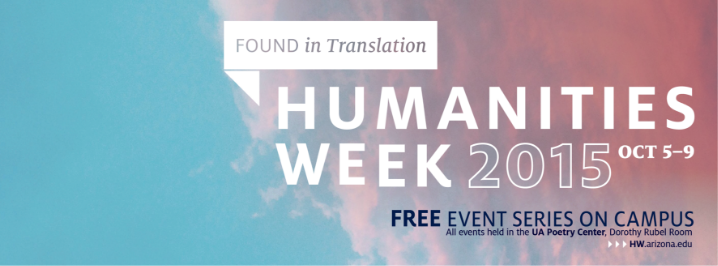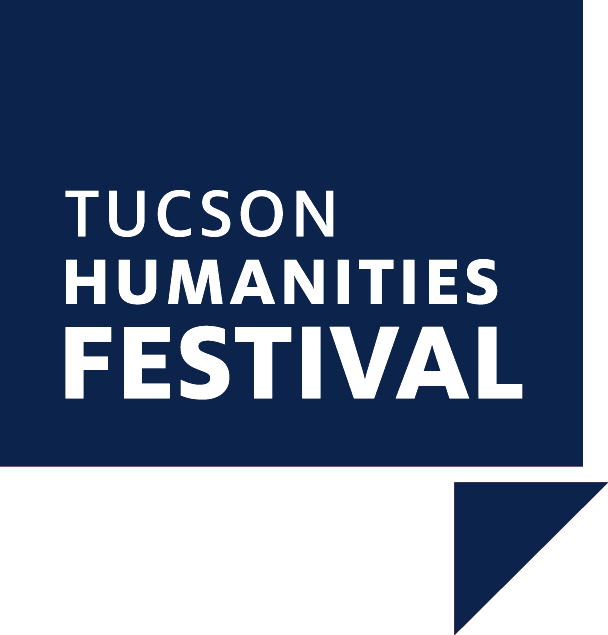2015 Tucson Humanities Festival

What can we discover about ourselves by decoding the past through film, literature, and music? In this week-long series hosted by the UA College of Humanities, you will explore contrasting cultures, international languages, and divergent ideas at the heart of what makes us human.
2015 Tucson Humanities Festival Videos
LOS INDIGNADOS: Spain and the Occupy Movement
Presenter: Malcolm Compitello, Spanish & Portuguese
Description
The Occupy Movement took American streets by storm in 2011 and galvanized opposition to the devastating effects of the financial crisis of 2008. But where did it all begin? These American protests were motivated by a number of acts of resistance to political and economic abuses around the world. One of the most important precursors was what has come to be known variously as the Indignado Movement, 15-M, or #Spanishrevolution. Examine Spain’s Indignado movement, while uncovering how it gained popular support and returned grassroots resistance to the forefront of democracy around the world and learn the particular importance that cities played in this process. Discover the crucial role that cultural production, especially digital cultural forms, played in these transformations.
DIVINE ROMANCE: Love, Sex, and Religion in Indian Ballads
Presenter: Caleb Simmons, Religious Studies
Description
Human relationships are at the center of every culture. How does the divine intertwine with romantic notions? Get acquainted with the myths of the goddess Cāmuṇḍēṡvari and the god Nañjuṇḍēṡvara that are contained in folk ballads in the South Indian language of Kannada. Learn how the details of these songs reflect human desire and the complicated nature of human relationships. Then discover the implications of these tales on concepts of the divine and divine love.
MAN VS. MACHINE: Translation in the Digital Age
Presenter: David Gramling, German Studies
Description
Advances in machine translation over the past 25 years have led us to wonder whether, in the digital age, the role of human effort in translating meanings from one language to the next may be diminishing. Whether out of pride or fear, working translators often insist that human beings, because of our cultural attunement and emotional subtleties, translate better than machines do, and always will. However, in an era of unprecedented and complex migration and mobility, more and more institutions and corporations are finding it practical to outsource translation and interpreting services to off-site, multilingual platforms, in order to ensure the quick and easy flow of goods and services in transnational markets. Given such a persistent human desire to translate, and to translate well, Gramling’s talk explores what this development ultimately may mean for the human condition in the 21st century.
MORE THAN WORDS: Translating culture in language
Presenter: Irene d’Almeida, French & Italian
Description
“To speak … means above all to assume a culture” the cultural and political critic Frantz Fanon said but in speaking, writing or translating a langue not our own, how do we assume the unfamiliar culture? Our language is so basic to our everyday lives that we rarely think about all the implications that the words we use might have. However, when we speak a foreign language, we are likely to suddenly become more aware of these implications as we try to make our meaning clear. Are we really saying what we think we are saying? This awareness becomes even more acute when we attempt to translate from one language to another and find we must consider not only the literal meaning of words but their cultural context. In colonial cultures these differences demonstrated how basic language is to human identity and how virtually impossible it is to suppress that identity. Using examples from Fon, one of her native tongues, d’Almeida will discuss the particular difficulties and challenges in trying to translate not only the correct meanings but also the cultural implications of words from one language to another.
FIELD HAND FARE: Diet and Slavery in the American South
Presenter: Jerome Dotson, Africana Studies
Description
Bacon has become an obsession in today’s society, but few realize the historical and cultural connotations of pork. Slaves in the Cotton South ate pork as a major part of their diet during the antebellum period; more than a ration, slave owners argued hog meat gave slaves a healthier appearance. Yet, the consumption of fatty pork held different significance for masters and slaves. Discover the symbolic meanings that both slaves and Southern whites attached to swine eating in the antebellum era.
A DATE WITH A TRAIN: Anna Karenina on Screen
Presenter: Russian & Slavic Studies Department
Description
Love, sex, blood, guts, a disastrous horse race, and a hip mazurka – Anna Karenina is a book that has it all. See how directors from around the world have translated Anna from page to screen. That train notwithstanding, actresses from Greta Garbo to Keira Knightley show that nothing can keep a good (bad?) woman down. At this annual closing event of Humanities Week, the Russian & Slavic Studies Department celebrates the work of Count Lev Nikolayevich Tolstoy in readings and video clips that highlight key elements in the story of his famous heroine.
MUSICAL WORDS: Opera and Poetry in Arizona Lady
Presenter: Alberto Ríos, Arizona Poet Laureate
Description
Arizona poet laureate Alberto “Tito” Ríos discusses his experience working on the Spanish libretto for Arizona Opera’s Arizona Lady. Written in 1953 as a love letter to the Southwest, the hopes and dreams of leading lady Lana Farrell ride on the back of one horse, “Arizona Lady,” winning the Kentucky Derby. Presented in partnership with Arizona Opera, Arizona Lady opens to Tucson audiences on October 10. Ríos will reflect on his lifelong fascination with the art of translation. After all, it is through translation that diverse cultural borders and boundaries are either created or destroyed. At the conclusion of this talk, Ríos will also read from his new book, A Small Story About the Sky.
WHEN THE RIVER RUNS CLEAR: Water in Contemporary China
Presenter: David Pietz, East Asian Studies
Description
Droughts are common in Arizona but water problems affect unexpected regions around the world, including North China. Nature and culture have conspired to critically shape the waterscape of the North China Plain. This region is unique because local communities and the state in China have tried addressing this ecological challenge for centuries, often in remarkably creative and effective ways. The water problem has been compounded by the breakneck pace of economic and social change during the last several decades and has added a new layer to this problem. Explore the contemporary challenges of water scarcity in China through the lens of history, seeking a translation of sorts of historical experience into a more nuanced view of China’s water challenges and the potential national and international consequences of resource constraints.
BURCHIELLO REDRESSED: Translating Poetry with Images and Words
Presenters: Fabian Alfie, Professor, Italian; Aileen A. Feng, Assistant Professor, French & Italian; David Christiana, Professor, School of Art
Description
In 15th century Italy, Florentine poet-barber Domenico di Giovanni, nicknamed il Burchiello (1404-1449), was praised as one of Italy’s greatest poets, rivaling Dante and Petrarch. While Burchiello’s poetry set a new standard for comic poetry, inspiring generations of imitative “burchiellisti” poets, it presents readers and translators alike with a difficult interpretive problem: it is deliberately crafted nonsense. Professors Alfie and Feng discuss their forthcoming edition of Burchiello’s poetry, the first English translation of his work, while professor Christiana presents his etchings and designs based on select translations. Together, they will investigate two creative modes of inquiry—linguistic translation and visual counterpoint in literature—in order to both make Burchiello’s nonsense poetry accessible to a larger audience and to show the symbiotic relationship between text and image.

